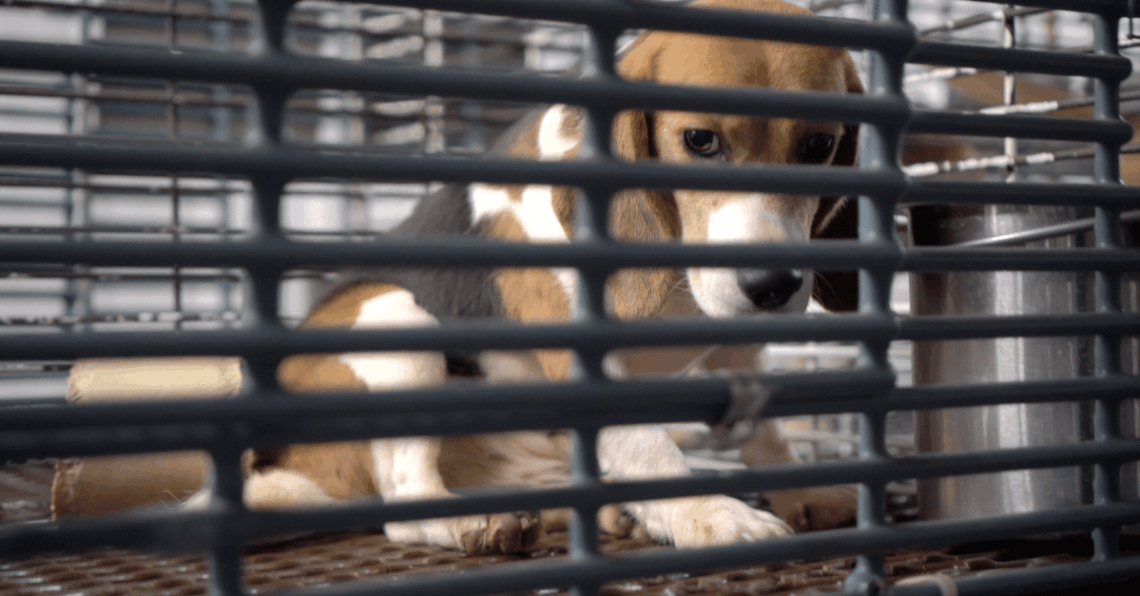Animal rights advocates often contrast humanity’s dismal treatment of animals farmed for food with our adoration bordering on worship of pet cats and dogs — the point being that these distinctions between animals that are equally sentient are arbitrary, hypocritical, and pointlessly cruel.
The comparison makes an important point, but it also conceals a grimmer reality: Humans treat the animals that we categorize as beloved companions horribly, too, breeding millions of them in puppy mills and even experimenting on tens of thousands of them every year in labs. And that in turn reveals something more fundamental about our relationship to animals. Whether they’re chickens, pigs, or dogs, the problem is the same: Nonhuman animals are commodities with no rights and few legal limits on what can be done to them.
Nevertheless, because of their relatively privileged position in human society, lab experimentation on dogs has attracted intense scrutiny in recent years. In 2022, the Virginia-based beagle breeder Envigo, which was one of the top suppliers of dogs for lab research in the country — essentially a factory farm for lab animals — shut down under pressure from a Department of Justice probe alleging that the company was grossly mistreating its dogs, even by the minimal standards set by the Animal Welfare Act (AWA).
Then, last week, the second largest remaining supplier of beagles to labs across the US (used for research including drug toxicity testing), Ridglan Farms outside Madison, Wisconsin, agreed to close its dog sales operation by July 2026 to avoid being prosecuted for felony animal cruelty. (Ridglan will still be allowed to conduct on-site animal research, for which it uses a small share of its dogs, but it won’t breed dogs to supply to other labs.)
At an evidentiary hearing last year, former Ridglan employees said they’d performed crude surgeries on beagles without pain relief, including removing prolapsed eye glands and cutting out their vocal cords, a measure meant to reduce noise from the densely packed barking dogs. “It still haunts me every day,” testified Matthew Reich, who worked at Ridglan from 2006 to 2010.
After Ridglan closes, only one major supplier of dogs for lab research will remain in the country. Dog experimentation in the US, in other words, might be approaching its end.
The remarkable case against Ridglan Farms — and what it means for science
What’s remarkable about these two closures is how exceedingly unusual they are. For the minority of lab animals who are protected under the Animal Welfare Act (rats and mice, along with several other classes of animals, are not covered by the law), research labs and breeders across the US are subject to federal oversight and inspections, where violations are routinely uncovered, from banal failures like filthy conditions and unfed animals to grotesque ones like accidentally scalding monkeys to death with industrial cleaning equipment.
But consequences of the kind that could actually prevent more animals from being mistreated are rare to nonexistent. The US Department of Agriculture can issue fines, which legally max out at $14,575 per violation, though the agency often discounts them significantly; the USDA’s Office of Inspector General has called penalties for violating the AWA “basically meaningless,” treated by violators as “a cost of doing business.”
Although Envigo and Ridglan agreed to close under deals with law enforcement, the primary driving force behind these outcomes was arguably — and, in Ridglan’s case, certainly — years of investigative work and pressure from animal rights advocates. Envigo became a major regional story after PETA released an undercover investigation there in late 2021. Ridglan, meanwhile, which houses around 3,000 beagles at any given time and sells them to university and private labs, had been the target of an undercover investigation by activists from the animal rights group Direct Action Everywhere (DxE).
In 2017, the activists entered the farm and found dogs confined in small, dirty stacked metal cages inside foul-smelling windowless sheds, spinning around in circles from boredom. They removed three beagles from the facility, in a tactic DxE calls “open rescue.”
Following that investigation, the three activists — Wayne Hsiung, Eva Hamer, and Paul Picklesimer — were charged with felony burglary and theft, which came with the potential to each spend more than a decade in prison. But those charges were dropped last year, and, in a remarkable reversal, Hsiung, along with a coalition of local animal advocacy groups, managed to flip the case on its head: They successfully petitioned a Wisconsin judge to appoint a special prosecutor to investigate Ridglan for animal cruelty.
It was a momentous result for animal advocates (including several people I personally know who’d been campaigning against Ridglan in Madison, where I live), and perhaps DxE’s greatest achievement to date. (In August 2021, before I was at Vox covering these issues for a living, I wrote to the Dane County district attorney to urge him to drop charges against the activists.) The judge’s decision implicitly affirmed something that the animal rights movement has been saying for decades. Law enforcement systematically ignores the abuse of animals in large-scale enterprises like factory farms and labs, and these facilities often rely on the privilege of nonenforcement to operate. In her order granting the activists’ petition for a special prosecutor, Judge Rhonda Lanford found probable cause to believe Ridglan violated Wisconsin’s animal cruelty laws, writing that the local district attorney had failed to act despite receiving reports of potential animal welfare violations.
The animal research community’s response to these findings has been mostly to close ranks. No prominent pro-animal research organization has, to my knowledge, publicly voiced concern over alleged conditions at Ridglan or called for accountability.
Americans for Medical Progress (AMP), a nonprofit that advocates for biomedical research using animals, told me in a statement that “Ridglan filled an important role in advancing veterinary medicine. … As that research capacity diminishes, it could become much harder for researchers to study and discover new ways to treat diseases in dogs and other animals. Responsible, well-regulated research remains essential to improving animal health and ensuring veterinarians can provide the best possible care.” (Ridglan’s dogs are used in both human and veterinary research, not solely for veterinary applications.) Last year, an AMP representative told Science magazine that Ridglan’s staff “put animal welfare first. They really abide by all of the strict regulations — everything that is in place.”
Defenders of animal research see themselves as locked in an existential war over the legitimacy of experimenting on animals (particularly animals that Americans treat as family), a war that has increasingly engaged members of the general public and politicians on both the left and right. The animal research community does not want to give an inch to animal rights advocates, nor accept limits on researchers’ autonomy to use animals as they see fit.
The rest of us, though, do not have to buy that premise. We have a choice of whether to accept the infliction of extreme suffering on gentle, trusting beagles, particularly for research with such an uneven record of helping humans. As Harvard bioengineer Don Ingber told me earlier this year, “everyone admits that animal models are suboptimal at best, and highly inaccurate more commonly.” If that’s true, it surely can’t be the case that science sees animal life as infinitely expendable.
Although ethical limits are sometimes framed as opposed to scientific progress, they are, in fact, constitutive of it. The slow unraveling of dog experimentation suggests that our better moral judgments can override institutional inertia — but it also shows how arbitrary the lines are that we draw between species, and how much further we have to go beyond the animals we’ve decided to love.
The post The secretive dog experimentation industry is crumbling appeared first on Vox.




